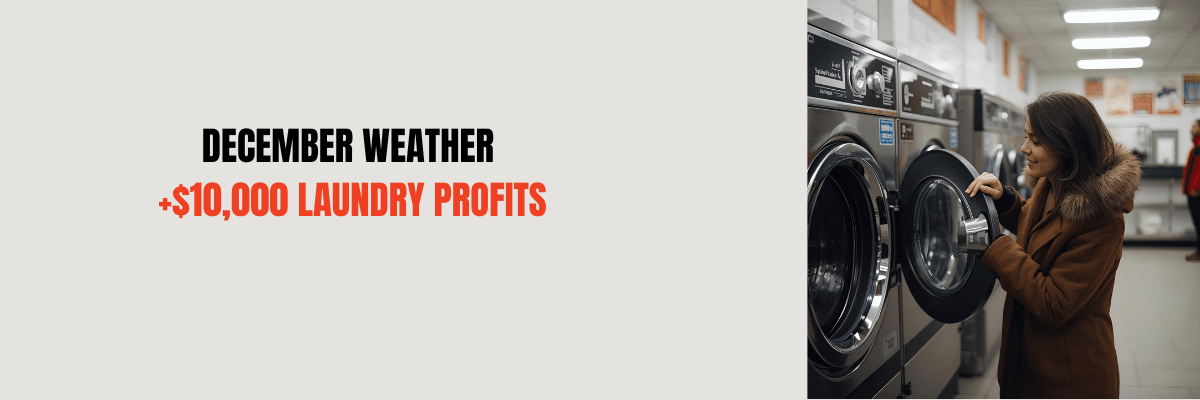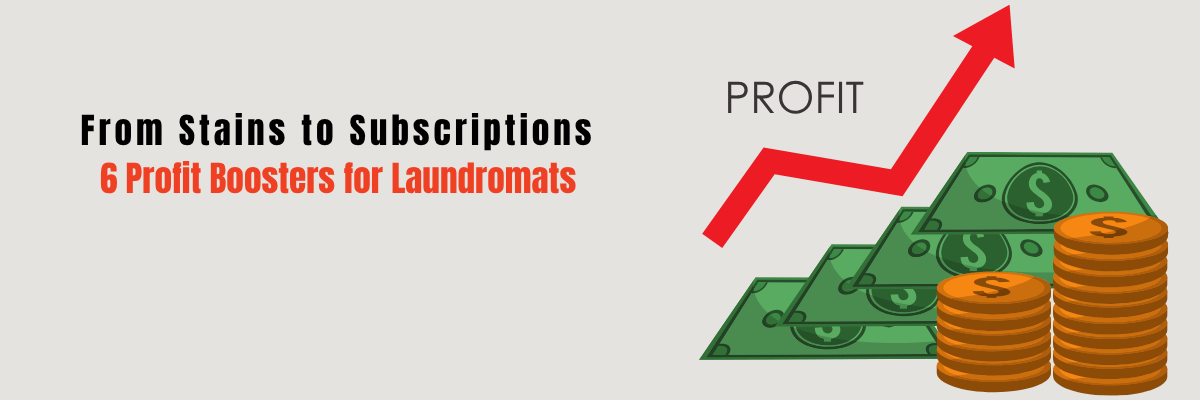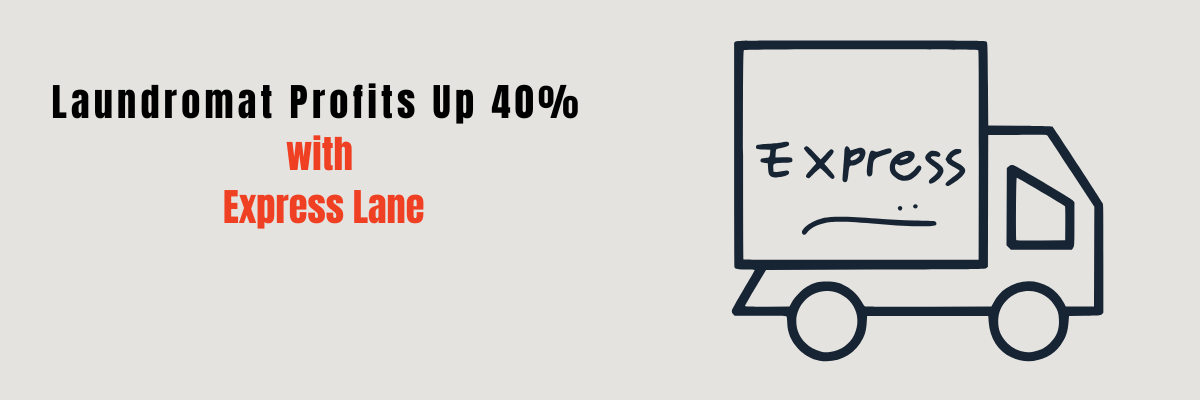Is a Laundromat a Truly Good Passive Investment? Examining the Evidence


Investing in a laundromat is often touted as a way to earn passive income, but is it really a truly passive investment? Let's examine the evidence. First, let's define what we mean by passive income. Generally, passive income is income that requires little effort to maintain. In other words, it’s income that you can earn without having to actively manage the business. With a laundromat, this means you don’t have to be present to operate the machines.
Is a laundromat a good investment?
"Before making any investment decisions, it's essential to ask questions like 'Is a laundromat a good investment?' and conduct thorough research to ensure the best possible outcome."
Welcome to our blog, where we embark on a journey of exploring various investment opportunities. Today, we dive into the intriguing world of entrepreneurship and ponder the question that's often asked by budding investors: "Is a laundromat a good investment?" Join us as we delve into the factors that make this business venture both enticing and challenging, helping you gain valuable insights to make informed decisions in your financial endeavors.
Investing in a laundromat has many potential benefits that make it a desirable passive income stream. For starters, laundromats typically have automated machines that customers can use to wash and dry their clothes. This means the owner doesn’t have to be present to operate the machines.
Additionally, laundromats have relatively low overhead costs compared to other businesses. Once the machines are installed and the rent is paid, the main expenses are utilities and maintenance. Furthermore, people always need to wash their clothes, so there is a steady customer base for laundromats.
As long as the machines are well-maintained and clean, customers will continue to use them. The minimal staffing requirements also make a laundromat a desirable passive income stream.
Finally, laundromats are generally considered to be recession-proof. This is because people will always need to wash their clothes, regardless of economic conditions.

Automated Machines: Laundromats are usually equipped with automated machines that customers can use to wash and dry their clothes. This means that the owner does not need to be present to operate the machines, which can save a lot of time and effort.
Low Overhead Costs: Laundromats have relatively low overhead costs compared to other businesses. Once the machines are installed and the rent is paid, the main expenses are utilities and maintenance.
Steady Customer Base: People always need to wash their clothes, so there is a steady customer base for laundromats. As long as the machines are well-maintained and clean, customers will continue to use them.
Minimal Staffing Requirements: Laundromats do not require a large staff. One or two employees can manage the store and maintain the machines.
Recession-Proof: Laundromats are generally considered recession-proof since people will always need to wash their clothes, regardless of economic conditions.
Risks of Investing in a Laundromat
The laundromat business comes with its own set of pros and cons, offering opportunities for steady income but also presenting challenges such as high utility costs and equipment maintenance. Despite the potential benefits, owning a laundromat is not a completely passive investment. It requires an initial investment, ongoing maintenance, and management to ensure that the machines are well-maintained, the store is clean and safe, and customers are satisfied.
Setting up a laundromat can be expensive, especially if you’re building from scratch. You’ll need to purchase or lease commercial property, buy equipment, and pay for permits and licenses. Additionally, maintaining and repairing equipment can be costly, and breakdowns can lead to lost revenue and dissatisfied customers.
Laundromats can also be highly competitive, particularly in urban areas with a high population density. You’ll need to differentiate yourself from other laundromats to attract customers and build a loyal customer base. Furthermore, laundromats can be targets for crime, such as theft or vandalism.
You'll need to invest in security measures such as cameras, alarms, and adequate lighting. Finally, as a business owner, you’ll need to comply with various regulations, including zoning laws, health and safety codes, and employment laws. Failure to comply can result in fines, penalties, or even lawsuits.

Initial Investment: Setting up a laundromat can be expensive, especially if you're building from scratch. You'll need to purchase or lease commercial property, buy equipment, and pay for permits and licenses.
Maintenance Costs: Maintaining and repairing equipment can be costly, and breakdowns can lead to lost revenue and dissatisfied customers.
Competition: Laundromats can be highly competitive, particularly in urban areas with a high population density. You'll need to differentiate yourself from other laundromats to attract customers and build a loyal customer base.
Security Concerns: Laundromats can be targets for crime, such as theft or vandalism. You'll need to invest in security measures such as cameras, alarms, and adequate lighting.
Legal Issues: As a business owner, you'll need to comply with various regulations, including zoning laws, health and safety codes, and employment laws. Failure to comply can result in fines, penalties, or even lawsuits.
How to Maximize Passive Income in a Laundromat
If you're looking to maximize passive income in a laundromat, here are some tips to help you achieve that goal:
Optimize Your Equipment: The average laundromat's return on investment (ROI) largely depends on the efficiency of its equipment, such as washers and dryers. One of the keys to maximizing your passive income in a laundromat is to ensure that your equipment is operating efficiently. You can do this by regularly maintaining your machines and investing in high-quality washers and dryers that are designed for energy efficiency. Not only does this reduce utility costs, but it also improves the overall lifespan of your machines, directly impacting the profitability and ROI of your business in the long run.
Offer Additional Services: In the laundry industry, providing excellent customer service is key to retaining customers and driving business growth, especially when you purchase a laundromat. To increase your revenue, consider offering additional services such as vending machines, selling laundry supplies, or even providing free Wi-Fi. This can not only enhance the experience at the average laundromat, but also increase customer satisfaction and encourage repeat visits, ultimately improving your bottom line and building customer loyalty.
Focus on Customer Satisfaction: In any business, customer satisfaction is essential for success. Ensure that your laundromat is clean, well-maintained, and user-friendly. This will not only increase customer satisfaction but also help to attract new customers.
Implement Automated Payment Systems: In your laundromat buisness, providing excellent customer service while maximizing operational efficiency is essential to achieving a good return on investment (ROI). One strategy to enhance both aspects is by installing automated payment systems, such as card-operated machines. This offers several pros: it reduces the need for staff, minimizes the risk of cash theft or loss, and can streamline operations at the average laundromat. However, there are also cons to consider, such as the initial investment cost and potential maintenance. Despite these challenges, the long-term benefits can positively impact the laundromat’s overall ROI.
Increase Your Marketing Efforts: To increase the number of customers that use your laundromat, consider investing in laundromat marketing campaigns. This could include advertising in local newspapers, distributing flyers, or even creating social media profiles.
Manage Your Operating Costs: To maximize your profits, it's important to manage your operating costs. This includes reducing your utility costs, optimizing staffing levels, and ensuring that you have a proper accounting system in place.
Consider Adding Drop-Off Services: Adding drop-off services can help to attract new customers and increase your revenue. This can be especially effective in areas with a high population density or with many working professionals who have limited time for laundry.
By implementing these tips, you can help to maximize your passive income in your laundromat business. Remember, owning a laundromat requires ongoing management and maintenance, but with proper planning, you can create a successful and profitable business model that provides you with passive income for years to come.
While owning a laundromat can provide passive income, it's not completely passive. It requires an initial investment, ongoing maintenance, and management to ensure that the machines are well-maintained, the store is clean and safe, and customers are satisfied. However, with proper planning and management.
Based on available evidence, it appears that owning a laundromat can be considered a partially passive investment. While the initial investment can be significant, and some degree of ongoing maintenance is required, the day-to-day operations of a laundromat can be managed by hired employees.
Additionally, the laundromat business model has proven to be relatively stable and profitable over time, with steady demand from customers. However, it's important to note that success in the laundromat industry depends heavily on location, competition, and market trends. As with any investment, thorough research and careful consideration of all factors are necessary before making a decision.
A laundromat software services providing company can play an important role in helping laundromat owners to generate passive income from their business. Here are some ways in which such a company can help:
Automated management: Laundromat software can automate many of the management tasks associated with running a laundromat, such as scheduling, billing, inventory management, and maintenance tracking. This can help to reduce the amount of time and effort required to manage the business, making it more passive.
Improved efficiency: By automating management tasks, laundromat software can also help to improve the efficiency of the business. This can lead to lower costs, higher revenue, and greater profitability.
Customer engagement: Many laundromat software solutions include customer-facing features, such as mobile apps, loyalty programs, and online booking systems. These can help to attract and retain customers, which can lead to higher revenue and greater profitability.
Data analysis: Laundromat software can also provide valuable data analysis tools, which can help owners to identify trends, optimize pricing, and make more informed business decisions. This can help to maximize revenue and profitability over time.
Overall, a laundromat software services providing company can help laundromat owners to run their business more efficiently and effectively, which can lead to greater passive income generation.
Frequently Asked Questions (FAQ) about "Is a laundromat a good investment?"
Question- What is a passive investment in the context of a laundromat?
Answer- A passive investment in a laundromat refers to owning and operating the business without active day-to-day involvement. Investors typically hire a management team to handle operations while they earn passive income.
Question- Is a laundromat truly a passive investment?
Answer- While laundromats can offer relatively passive income streams, it's essential to recognize that some level of supervision and oversight may still be required, especially during the initial setup phase and when dealing with significant issues.
Question- What factors make a laundromat a potentially good passive investment?
Answer- The location of the laundromat plays a crucial role. A strategically placed laundromat in a densely populated area with limited laundry facilities can attract a steady flow of customers, enhancing the passive income potential.
Question- How much capital is required to invest in a laundromat?
Answer- The initial investment cost can vary significantly depending on factors like location, size, and the state of the existing infrastructure. It's essential to consider the costs of acquiring or leasing the space, purchasing equipment, and renovating if needed.
Question- What are the ongoing responsibilities for a passive laundromat investor?
Answer- While the day-to-day operations are handled by hired staff, passive investors still need to oversee financials, ensure proper maintenance of equipment, and monitor the overall performance of the business.
Question- What are the potential risks associated with investing in a laundromat?
Answer- Like any business, a laundromat investment carries certain risks. Market saturation, unexpected maintenance costs, and changes in customer behavior are some of the common risks to be aware of.
Question- How can I maximize the passive income from my laundromat investment?
Answer- Offering additional services like drop-off or pick-up and delivery options, maintaining a clean and inviting space, and optimizing equipment efficiency can attract more customers and increase revenue.
Question- Is it advisable to partner with someone for a laundromat investment?
Answer- Partnering with someone can help share the financial burden and responsibilities, making it easier to manage the business while maintaining a passive role.
Question- What are some essential tips for first-time laundromat investors?
Answer- Conduct thorough market research, seek expert advice, create a comprehensive business plan, and be prepared to adapt and make informed decisions as circumstances evolve.
Question- Can owning a laundromat be a viable long-term passive investment?
Answer- If properly managed and located, a laundromat can indeed provide a stable and sustainable passive income stream, making it a viable long-term investment option for many investors.






